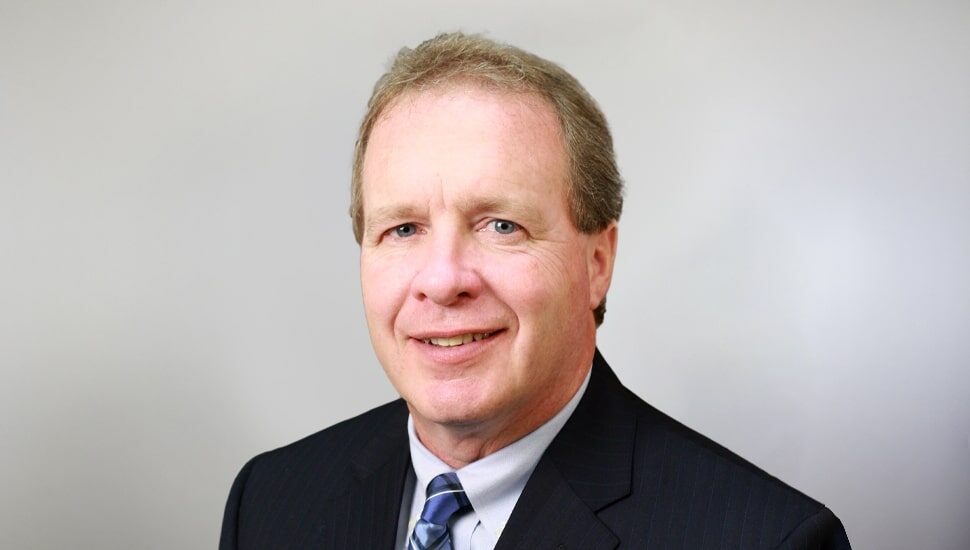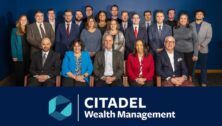Bucks County Leadership: Mike Fitzgerald, Market President, Univest Bank


Mike Fitzgerald, market president for East Penn and New Jersey at Univest Bank, spoke to BUCKSCO Today about growing up in Philadelphia and Holland and the pervasive influence wrestling has had on his life – from being a captain in high school, returning to coach his alma mater after college for seven years and returning as an assistant coach this year. He also recounted how his parents inspired a work ethic that once earned him a raise on his first day at a new job.
Fitzgerald also discussed his career in banking, the mentors who shaped him, and how he landed at Univest. He shared how Univest’s traditional values set it apart and how his volunteer work with adults with disabilities inspires him.
Where were you born, and where did you grow up?
I was born the youngest of two boys in Philadelphia and lived in the Mayfair section until I was about eight. Then I moved to Holland in Bucks County.
About 30 years ago, I bought and moved back into the house I was raised in. It’s a small street, and three other people who were born and raised on the street bought their parents’ homes.
What did your parents do?
My dad worked for Sears on The Boulevard. He was in the union for quite some time, then moved into a management role. My mom worked part-time doing administrative and secretarial work.
What memories do you have of growing up in Holland?
I have a lot of memories of sports. My dad would take Fridays off in the summers for a couple of years while my mom was working, and we’d always do something fun like miniature golf or playing baseball.
What sports did you play when you were growing up?
I did – primarily wrestling through grade school for the Council Rock youth organization and high school at Archbishop Wood High School. I was the captain of my high school team.
I got the opportunity to go back to coach at Archbishop Wood when I graduated from college. I spent two years as the assistant coach and five years as the head coach. This year, I’ve gotten involved again and am excited to be serving as the assistant coach. I’ve so enjoyed coming back to wrestling after taking a 30-year hiatus. It’s so enriching and invigorating working with the coaching staff and the student-athletes.
What drew you to wrestling?
Wrestling teaches you to trust in yourself and trust in your instincts. If you want to take somebody down, you have to go for it. Nobody’s going to let you do it. If you don’t attempt that success, you will fail immediately. That trust in yourself and the work ethic to be successful plays a big part in life.
What part-time jobs did you have growing up?
In high school, I used to work for a landscaper who would pay us piecemeal, so the more you did on your round, the more money you would make. You could slack off and make a couple of bucks, or you could bust your ass and do really well. That fits the mold of wrestling, to keep pushing yourself.
I stayed with that through college, working for a big landscaper and nursery in Richboro. He gave me a lot of opportunities to succeed and take on some manager roles. I’ll never forget my first day working there. He comes up to me, and I’m like, oh boy, what did I do? He said, “I’m going to give you a $0.25 raise.” On my first day. He said, “I appreciate your work ethic. You’re using both hands.” It all goes back to what I learned in wrestling.
You had your act together in high school.
I wouldn’t say that. Not many high school kids have their act completely together. But my parents taught me some lessons about hard work and giving back to the community. My dad was always very active in the community and very hardworking. He worked his way up from stacking pencils as his first job to being in management. I also learned a lot from my mom who was always there as a family mom, keeping the family stable.
Is there a favorite wrestling match you remember from high school?
We were wrestling for the Catholic League championships during my junior year. During the match, I cracked my rib and got knocked out. But back in the 80s, they just came out and put smelling salts under my nose and said, “Get the hell back out there.” I remember that one distinctly – getting back up and winning the match. We ended up winning the Catholic League.
In my senior year, it was the complete opposite. I was the captain, and here’s how you learn from failure: I wrestled a kid I had beaten before. I had never lost to him during all four years. I go in, I get a little cocky, he catches me, and he beats me for the first time ever. We ended up losing the Catholic League championship that year. I learned not to take things for granted from that expereince.
What kind of music were you listening to in high school and college?
I don’t remember what I was listening to. It was probably a pretty diverse mix. I remember Fleetwood Mac was big, and I enjoyed Fleetwood Mac. I enjoyed Peter Frampton, Supertramp, AC/DC, Elton John, Billy Joel – the whole spectrum of music.
I assume you were a good student. Where did you end up going to college?
No, I wasn’t. Work ethic is different than student ethic – I didn’t necessarily have my stuff together academically.
In high school, I was just smart enough to do whatever I had to get B’s. In college, I screwed up pretty hard that first semester.
I went to Lycoming College to get away from home. But my mom and dad said, “Listen, we’re not going to help pay for college if you’re just going to sneak through and get C’s.” I started applying myself and started to do well.
I really enjoyed my college years. I joined a fraternity and ended up being the president of the fraternity and president of the entire fraternity system.
When you look back over your career, Mike, who were the people who saw promise in you and opened up doors?
I’ve always been lucky in terms of people seeing my potential and giving me the opportunity to make that potential happen.
When I started my banking career, a gentleman named Bill Richmond worked for Meridian Bank. He convinced me to go into the retail side of banking and moved me along quickly to becoming a branch manager. Then I realized I wanted to be on the commercial side. So, I went to Fidelity Bank, still as a branch manager, but I had the opportunity to learn some commercial lending.
As they started phasing out commercial lending on the branch side, a gentleman who knew me offered me a job at First Valley Bank. My boss at the time, Bud McKeller, taught me to be a better lender.
What do you think Bud and Bill saw in you?
I think Bud saw that I wasn’t maximizing my potential. He knew I had more potential and pushed me along. He wasn’t afraid to challenge me and taught me to be a good manager. He was very frank and up-front. It wasn’t personal; it was business.
I always appreciated his directness. That’s how I coach, and that’s how I operate as a manager – I’m very direct. Some people like it, and some people don’t.
Was there anybody else who propelled you along your path?
Bud got me to the point of confidence in what I was doing. When I got to Sovereign Bank, there were two gentlemen named Joe Whalen and Barry Lennington. They gave me the autonomy to do what I needed to do. They didn’t micromanage. I took advantage of that autonomy, and I was very successful.
What brought you to Univest?
I was with Sovereign Bank up through the economic crisis in 2009, and then I went to Fox Chase Bank. There’s a fourth person who gave me my biggest opportunity – a gentleman by the name of Tom Petro. For years, he would call and talk. Fox Chase Bank was small – they weren’t ready for the kind of lending my team and I were doing and vice versa.
Then the financial crisis hit. I called Tom to help somebody else find a job. He said, “How about you and I talk?” This was 2008 or 2009 – the world was upside-down. Sovereign was going through its issues. I didn’t particularly like how they handled things. So, I said, “Perfect, let’s talk.”
He said, “This is my vision.” It matched what we could bring to the table and gave me the opportunity to bring over a team. He said, “We’re a billion-dollar bank. We’re primarily consumer. We want to change our balance sheet and make it a commercial bank, so I want you to lead that opportunity.” And I had the opportunity to bring over five people from the team at Sovereign. He gave me a career opportunity in the worst crisis in recent memory.
Tom and I had some good, hard, well-thought-out, and sometimes very frank conversations. Some of them weren’t easy conversations, but I had learned, from Bud and others and from wrestling, to be direct. Tom had what he called BHAG – big, hairy, audacious goals – for the organization. I bought into it and truly believed in his vision of where he could take the company and the organization. Tremendous leadership skills by Tom and Jerry Holbrook and Robert Deacon. They allowed me to bring my team on board, become chief lending officer and assist taking the Bank in a different direction. The team that surrounded me are also a primary reason for the success of both myself and the organization. You cannot do it alone.
I landed there in 2009, and our goal was to sell the bank within seven to 10 years. It was a risk – we were going to this little bank in the worst economic crisis of the time to try to do things outside the box.
How did Univest come in?
Seven years to the day after I joined Fox Chase Bank, we got bought by Univest. I could have left and gone to another organization, but Jeff Schweitzer and Mike Keim, the president, and CEO, of Univest, were two younger guys with a phenomenal vision for where the bank needed to go. At first, I was going to run a little Fox Chase division, but the next thing you know, another division opened up and I ended up serving as market president for eastern Pennsylvania and New Jersey, which includes Philadelphia. Again, I found people who believed in me and gave me so much opportunity because they trusted me and my vision.
I look at the different people along the way – my father and mother, of course; Bud; Tom, and the current group at Univest. My belief is that you can never be successful without having people around you who believe in you. I’ve been so blessed to have so many people, from family to my coworkers, to get me to where I’m at.
Many say Philadelphia is over-banked. What makes Univest unique and distinctive in a very crowded marketplace?
It’s the people and the culture. It sounds corny, but I genuinely believe that for our employees, we put family and God first. I always tell my team, “I don’t want to hear that you missed your kid’s sporting or musical event.” And we’re all active in our communities.
We have traditional values of doing the right thing for our clients and employees. We’re not going to outspend Citizens Bank and have a stadium with our name on it. But if every day, when we’re out there in front of a client, we can represent Univest the right way, that’s going to continue to drive our brand.
What opportunities and challenges you’re focused on now?
We’re embracing technology. We learned from COVID that you had to become IT-efficient. You had to learn how to be effective with virtual meetings to reach clients. Our organization has been quick to adapt to technology. We’re not going to lead the technology revolution, but we’ll take some of the best practices from larger banks. As long as we continue to be fast followers of the technological renaissance, we’ll be successful. It’s not just for technology’s sake; we’re trying to do it the right way – make the necessary investments in tech, but also keep the human touch.
We’re also being cognizant of conservative underwriting. Stick to your knitting – that’s one thing that’s always made us successful in good times and bad times. As our organization grows into Baltimore and Pittsburgh and continues to hire the right people and stay focused, I think we can be very successful.
What do you do with all your free time, Mike?
I co-founded a non-profit organization that helps employ adults with special needs. So giving back to the community is a very big part of my life. If we can make a little bit of a dent in the unemployment rate of the special needs community, which stands at 82%, and allow these adults to add value to the community and their lives, it’s a huge win.
Do you read much, Mike?
No, honestly, I don’t read as much anymore. I used to, but now I utilize different social media platforms, podcasts, etc. I haven’t sat down with a good book in six months.
In this crazy world that we live in, how do you stay optimistic and hopeful, Mike?
I think God has given me tremendous opportunities. I’ve been so blessed in my career. I’m also blessed to have the opportunity to work with special needs adults through my work with Classic Rock Auto Detail, Able Force and Requipd. Our adults wake up every day with such a positive attitude – the world is their oyster.
I look at my opportunity to coach wrestling again, not everyone has the chance at 59 to go back into a sport they love so much and actively be involved. In banking, we look at how we make a difference in people’s lives through loans. When I think of the employees that benefit from these loans, me and my teams have likely helped tens of thousands of people and their families over the years. Any chance to give back, whether through not-for-profit work or your traditional business, is how I try to stay optimistic.
Finally, Mike, what’s the best advice you have ever received?
It’s never been a specific piece of advice – it’s the influence of people around me, going back to my dad showing me how to give back to the community by coaching and working with organizations. And the Bud McKellers, the Tom Petros, the Mike Keims giving business opportunities to me and challenging me to take advantage of them.
Not everybody sees the opportunity that’s being presented to them. So, I think it goes back to my mom and dad teaching me to work hard, Lou Gensch at Gensch’s Nursery, my first college job where I got a $0.25 raise on my first day because I was pulling weeds out with two hands as opposed to one hand. I didn’t know he was giving me the opportunity, but that confidence and work ethic helped me.
I’ve screwed up more times than I can remember. I think back to wrestling – I cost us a championship, but I also helped us win a championship. The biggest lesson is making sure you learn from those experiences. From an early age to today, I’m continually trying to learn.
My advice is, “Don’t be afraid to get outside your comfort zone. When’s the last time you did something for the first time?”
_________
Univest Bank and Trust Co. is Member FDIC, an Equal Opportunity and SBA Preferred Lender.
Connect With Your Community
Subscribe for stories that matter!
"*" indicates required fields





























